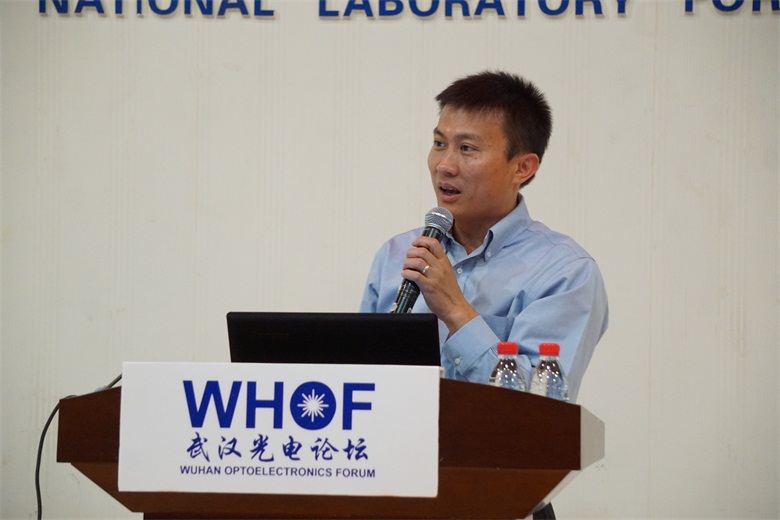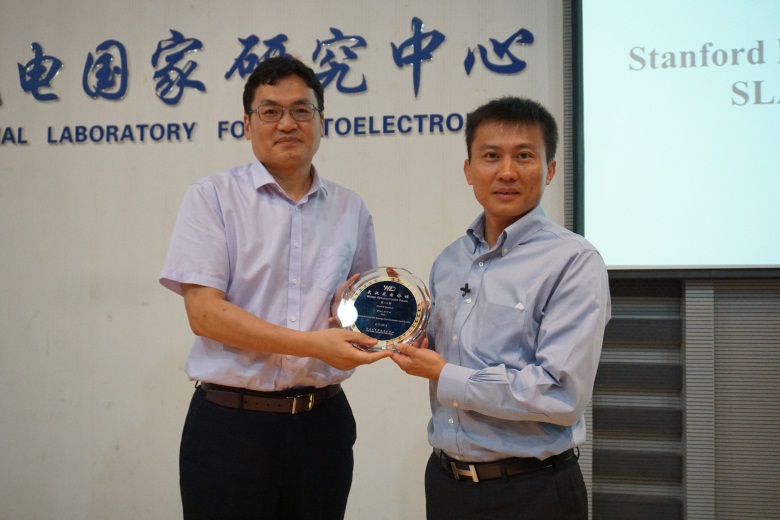WUHAN, China (July 4, 2018) - Wuhan Optoelectronics Forum No. 144 was successfully held in Auditorium A101 at Wuhan National Laboratory for Optoelectronics (WNLO) in the afternoon of July 4. Prof. Yi Cui from Stanford University delivered an exciting talk entitled Nanotechnology for Energy, Environment and Textile. Prof. Yongming Sun, from WNLO chaired the forum. Prof. Xinliang Zhang, Deputy Director of WNLO, awarded Prof. Yi Cui the forum medal.
Nanotechnology has provided a novel technology platform which can address critical energy and environmental problems and enable new opportunities. In the past decade, my group has conducted research on innovative ideas to address problems related to energy conversion, storage and saving, and environment cleaning (air, water and soil), to create new opportunities in wearable applications. Here I will show exciting examples, including: 1) high energy battery materials including Si and Li metal anodes and S cathodes; 2) electrochemical tuning of catalysts; 3) Water disinfection using conducting nanofilters and uranium extraction for seawater. 4) Nanofiber air filters for efficient PM2.5 removal and low air resistance. 5) Cooling and heating textile for personal thermal management. Nanotechnology represents the most important foundational technology platform to impact nearly all areas of applications.
Yi Cui is a Professor in the Department of Materials Science and Engineering at Stanford University. He received B.S. in Chemistry in 1998 at the University of Science and Technology of China (USTC), Ph.D in 2002 at Harvard University. After that, he went on to work as a Miller Postdoctoral Fellow at University of California, Berkeley. In 2005 he became an Assistant Professor in the Department of Materials Science and Engineering at Stanford University. In 2010 he was promoted with tenure. His current research is on nanomaterials for energy storage, photovotalics, topological insulators, biology and environment. He has founded three companies to commercialize technologies from his group: Amprius Inc., 4C Air Inc. and EEnovate Technology Inc. He is a fellow of Materials Research Society, Electrochemical Society and Royal Society of Chemistry. He is an Associate Editor of Nano Letters. He is a Co-Director of the Bay Area Photovoltaics Consortium and a Co-Director of Battery 500 Consortium. He is a highly proliferate materials scientist and has published ~400 research papers. In 2014, he was ranked NO.1 in Materials Science by Thomson Reuters as “The World’s Most Influential Scientific Minds”. His selected awards include: Blavatnik National Laureate (2017), MRS Kavli Distinguished Lectureship in Nanoscience (2015), the Sloan Research Fellowship (2010), KAUST Investigator Award (2008), ONR Young Investigator Award (2008), Technology Review World Top Young Innovator Award (2004).

